53 min read

Hey there, fellow bloggers! Welcome to the dynamic world of blogging in 2024! where words weave the magic and visibility is the key to success!
Have you ever wondered how some bloggers seem to effortlessly climb the ladder of success while others struggle to find their footing? Well, let me spill the beans—it’s all about keywords. Yes, those little words that hold the magic key to getting your content noticed.
Now you must be wondering where and how you can find these magical keywords.
You must explore the ‘best keyword research tools for bloggers’ guide with me to get answers to these questions that arise in your mind. Are you ready to explore? Then let’s start!
Now, let’s start with the basics. What exactly is keyword research? It’s like being a detective for your blog, figuring out what words and phrases your audience is typing into search engines. And to aid us in this investigative journey, we have invaluable companions – Keyword Research Tools.
Now, let’s talk about the real heroes of our story—the best keyword research tools for bloggers. These are not just tools; they are the sidekicks that help us unlock the door to a world of impactful blogging.
Now, as we embark on this adventure together, know that the purpose of this article is to be your guide through the maze of keyword research tools. We’ll explore the 10 best keyword research tools that can elevate your blogging game in 2024, making your content not just good but’search engine royalty’ good.
List of the Best Keyword Research Tools for Bloggers
Welcome to the realm of the best keyword research tools for bloggers—your secret weapons in the world of online visibility:
- Semrush: A comprehensive tool that not only helps with keyword research but also provides competitive analysis and SEO insights.
- Ahrefs: Known for its backlink analysis, Ahrefs also offers powerful keyword research features, including keyword difficulty and search volume metrics.
- Ubersuggest: Developed by Neil Patel, Ubersuggest provides keyword suggestions, content ideas, and backlink data.
- Moz Keyword Explorer: Moz’s tool helps identify keyword opportunities and provides insights into the difficulty of ranking for specific keywords.
- Google Keyword Planner: Provided by Google, it offers insights into keywords and their search volumes based on Google’s data.
- Mangools KWFinder: Part of the Mangools suite, KWFinder helps find long-tail keywords with low SEO difficulty and provides valuable insights for content creation.
- SpyFu: Focused on competitive intelligence, SpyFu allows you to see the keywords that competitors are ranking for and their ad strategies.
- Long Tail Pro: Specializing in finding long-tail keywords, Long Tail Pro helps identify less competitive keywords that can be easier to rank for.
- Keywords Surfer by Surfer SEO: It is a tool designed to enhance SEO efforts by providing content optimization suggestions based on top-performing keywords.
- Serpstat: Similar to SEMrush, Serpstat offers a suite of SEO tools, including keyword research, site analysis, and competitor research.
We will investigate all the above tools in detail in the upcoming sections.
Now we have to determine the criteria for selecting the right keyword research tools in the next section.
Criteria for Selecting the Best Keyword Research Tools for Bloggers
Selecting the right tools for your keyword adventure is as crucial as choosing the perfect hiking gear for a mountain trek. So, let’s chat about the criteria that make these tools the best keyword research tools for bloggers in 2024:
User-Friendly Interface:
Look for a tool that is easy to use and navigate. A simple interface saves you time and makes the process enjoyable.
Accurate Search Volume Data:
Choose a tool that provides reliable information on how often people search for specific keywords. Accurate data helps you target the right audience.
Keyword Suggestions:
A good tool should offer a variety of keyword suggestions related to your topic. This helps you discover new ideas and expand your content.
Competitor Analysis:
Find a tool that allows you to peek at what keywords your competitors are targeting. Understanding their strategy can give you a competitive edge.
Cost-Effectiveness:
Consider your budget. Some tools can be expensive, so look for one that offers a balance between features and affordability.
SEO Difficulty Score:
Check if the tool provides a measure of how difficult it is to rank for a particular keyword. Lower difficulty scores indicate better opportunities.
Content Ideas:
Look for a tool that not only gives you keywords but also helps with content ideas. This can be a great asset in planning your blog or website content.
Regular Updates:
Ensure that the tool is regularly updated. Search trends change and an up-to-date tool will provide the most relevant information.
Customer Support:
Consider the availability and quality of customer support. A tool with responsive support can assist you when you encounter any issues.
Reviews and Recommendations:
Read reviews and seek recommendations from other users. Real experiences from people can provide valuable insights into the tool’s performance.
So, as we delve into the world of the best keyword research tools for bloggers, keep these criteria in mind. It’s not just about the popularity of a tool; it’s about how well it suits your journey. Let’s ensure that the tools we pick are not just tools; they are partners in our blogging adventure. Take your time, explore different options, and choose the one that aligns best with your blogging goals. Are you ready to find the perfect companions? Let’s go!
Further Reading:
- 10 Best Content Marketing Tools for Growth and Engagement
- 10 Best Affiliate Marketing Tools for Bloggers in 2024
Details of the Best Keyword Research Tools for Bloggers: 2024 Edition
Semrush
Hey there, dear bloggers! Imagine having a personal guide in the vast world of online content, helping you find the perfect keywords to boost your blog’s visibility. That’s exactly what Semrush, one of the best keyword research tools for bloggers, does. It’s like a treasure map for bloggers, guiding them to the most valuable keywords that can make their content shine. Get ready to dive into a world of possibilities to boost your blog’s visibility and skyrocket your traffic!
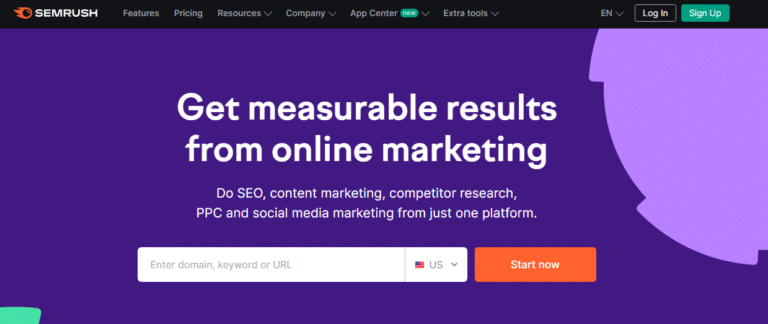
Image source: Semrush
Key Features🌟
Semrush keyword research is a summation of six significant tools, as follows:
- Keyword Overview: It helps to discover the optimal keywords for your blogging strategy by analyzing search volume, intent, keyword difficulty, CPC, competition level, SERP features, and more to optimize your strategy. To know the value of any keyword, the Keyword Overview tool provides essential metrics for any keyword in the Semrush database, aiding in the selection of targeted terms.
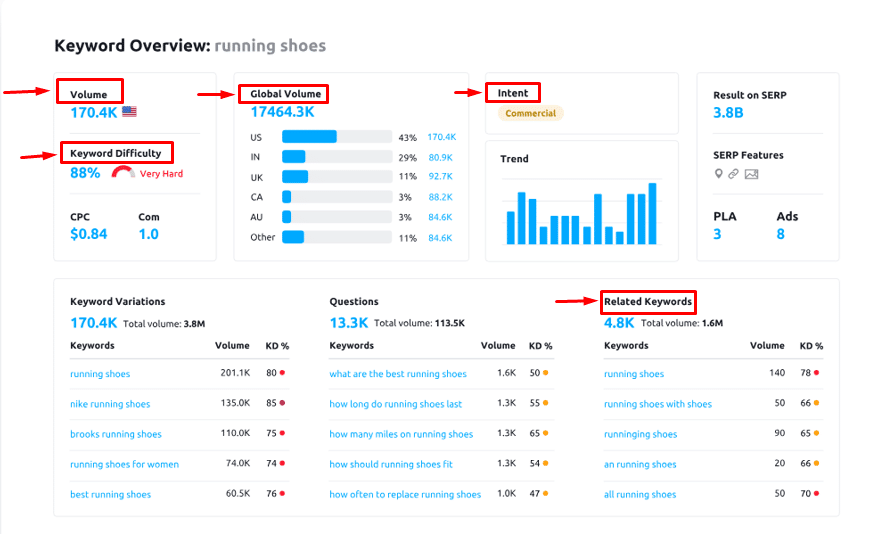
Image Source: Semrush
- Organic Research: It optimizes your organic keywords and discovers new strategies to rank for profitable keywords from competitors, thereby enhancing your chances of winning relevant SERPs for your target audience.
- Keyword Magic Tool: It explores a keyword toolbox with over 25 billion keywords and generates thousands of keyword combinations from one seed keyword.
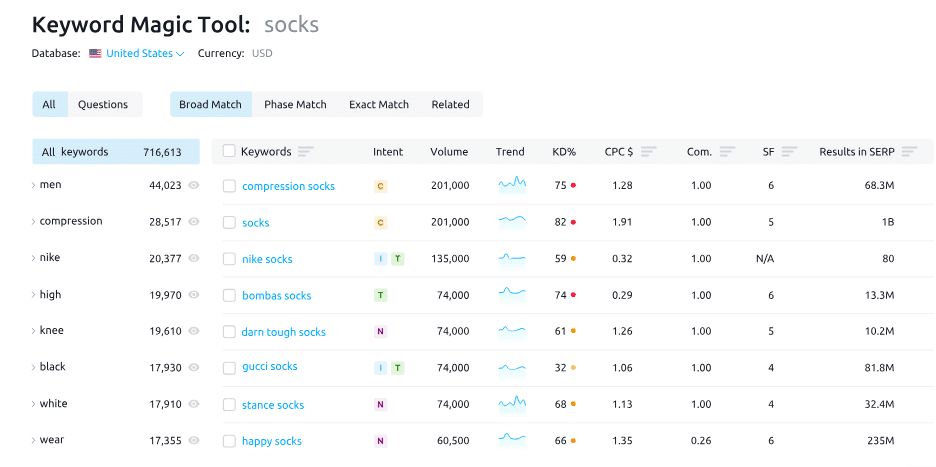
Image Source: Semrush
- Keyword Gap: It helps to discover new opportunities for efficient SEO campaigns with a simple solution that allows you to benchmark up to five keyword profiles simultaneously.
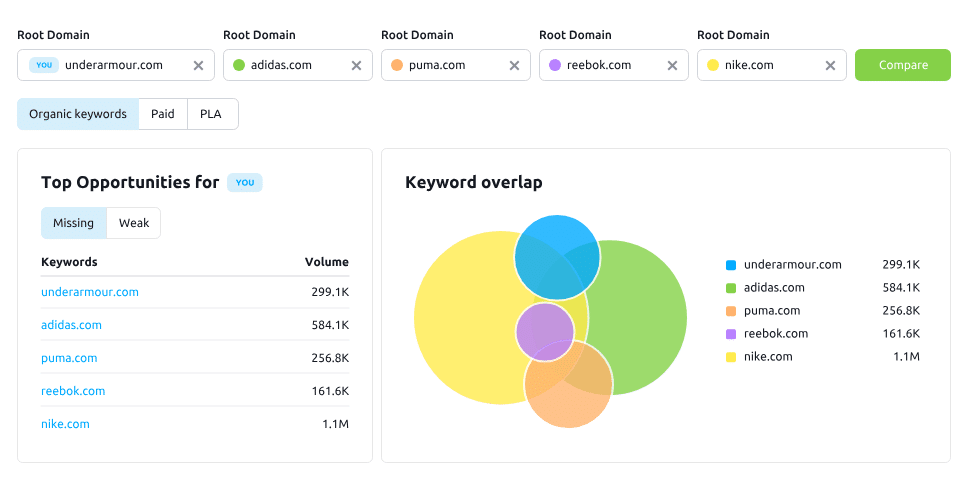
Image Source: Semrush
- Keyword Manager: Semrush offers a feature that automatically clusters lists of up to 2,000 keywords, allowing users to create clusters and lists from scratch or start from an existing list, integrate them with other Semrush tools, or export them for team sharing.
- Organic Traffic Insights: It utilizes Semrush’s integration with Google Analytics to identify “not provided” keywords and analyze your website’s organic search performance.
Moreover, The above Semrush keyword research tools have some other significant features:
- Keyword Analysis:
SEMrush provides detailed information about specific keywords, including search volume, competition level, and CPC (Cost Per Click) data. Users can explore related keywords and phrases, helping to identify additional opportunities.
- Related Keywords:
Semrush generates a list of related keywords based on the seed keyword you entered. This helps you identify variations and related terms that might be relevant to your content or SEO strategy.
- Position Tracking:
Semrush allows you to track the ranking of your website or specific pages for target keywords over time. This feature helps you monitor the effectiveness of your SEO efforts.
- Competitor Analysis:
The tool allows users to analyze the keywords that competitors are targeting, providing insights into their SEO and PPC strategies. Users can compare their own keyword strategy with that of competitors.
- Keyword Difficulty:
SEMrush helps users assess the difficulty of ranking for a particular keyword by providing a keyword difficulty score. This score takes into account factors such as competition, backlink profiles, and other SEO metrics.
- Search Volume Trends:
Users can track the historical trends of search volumes for specific keywords over time. This feature helps marketers understand the seasonality or changing popularity of keywords.
- Long-Tail Keyword Suggestions:
SEMrush generates suggestions for long-tail keywords, which can be valuable for targeting specific niches and capturing more specific search intent.
- SERP Analysis:
The tool provides insights into the search engine results pages (SERPs) for specific keywords. Users can see the top-ranking pages, featured snippets, and other elements that appear in the search results.
- Local SEO:
SEMrush includes features for local SEO, allowing users to target keywords specific to a particular location. It provides data on local search volumes, local competitors, and more.
- Exportable Reports:
Users can export keyword research data into various formats, making it easy to share and analyze the information.
- Integration with Other Tools:
SEMrush can be integrated with other digital marketing tools and platforms, enhancing its usability within broader marketing strategies.
- Mobile Search Data:
The tool provides insights into mobile search data, considering the increasing importance of mobile optimization in SEO
Pros and Cons✅/❌
✅Pros:
- Comprehensive Keyword Data: SEMrush provides a wealth of data on keywords, including search volume, competition, CPC, and trends.
- Competitor Analysis: The tool allows for in-depth competitor analysis, enabling users to identify and understand the strategies of competitors in terms of keywords.
- Keyword Difficulty Score: SEMrush’s keyword difficulty score helps users assess the feasibility of ranking for specific keywords, considering competition and other factors.
- Content Gap Analysis: The tool helps identify gaps in content by showing which keywords competitors are targeting but the user might not be.
- User-Friendly Interface: SEMrush provides an intuitive and user-friendly interface, making it accessible to both beginners and experienced marketers.
- Regular Updates: SEMrush continuously updates its database, ensuring that users have access to the latest keyword data and trends.
❌Cons:
- Cost: SEMrush can be relatively expensive for smaller businesses or individual users, especially when compared to some competing tools.
- Learning Curve: The tool’s extensive features may have a learning curve for new users, and it might take some time to fully explore and utilize all functionalities.
- Overwhelming Amount of Data: The sheer volume of data provided by SEMrush might be overwhelming for beginners, and users may need to filter and focus on the most relevant metrics.
- Limited Free Version: The free version of SEMrush has limitations, and to access the full range of features, users need to subscribe to a paid plan.
Statistics📊
- 10 million marketing professionals have already used Semrush
- Fortune 500 companies use Semrush as their go-to marketing tool
- 21 international awards as best SEO software suite
- The total number of keywords in Semrus’s Keyword Magic tool now exceeds 25.5 billion
- 20 million ideas for a single keyword
- 808 million domain profiles
- 140 geo databases
Note: The above statistical information has been taken from Semrush’s official website.
Pricing Plan💰
Semrush offers three different pricing plans: Pro, Guru, and Business, as follows:
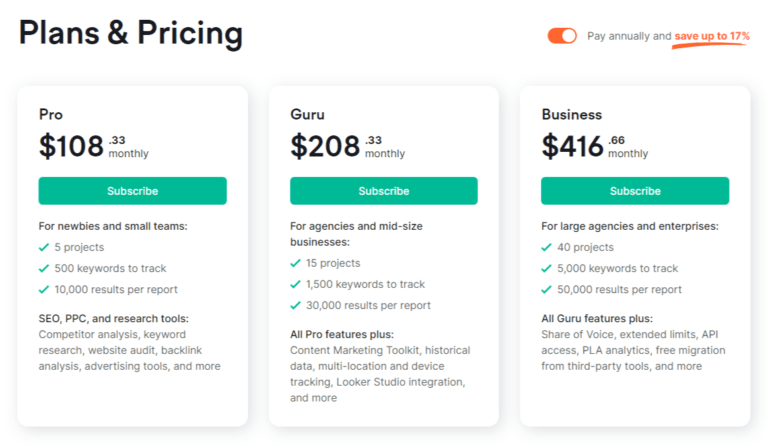
Image Source: Semrush
Note: The above plan is an annual pricing plan. The pricing plan can be changed at any time. For more and updated information, please visit the Semrush pricing page.
So, bloggers, if you’re on the lookout for the best keyword research tools for bloggers in 2024, Semrush is waving from the top of the list. It’s not just about finding keywords; it’s about arming yourself with the insights to conquer the blogging realm. Ready to let Semrush be your guide? Let’s dive into the keyword adventure together!
You May Read:
Ahrefs
Hey bloggers, let’s dive into the world of Ahrefs, the keyword maestro of 2024. Wondering what sets Ahrefs apart in the quest for the best keyword research tools for bloggers? Here’s the scoop:
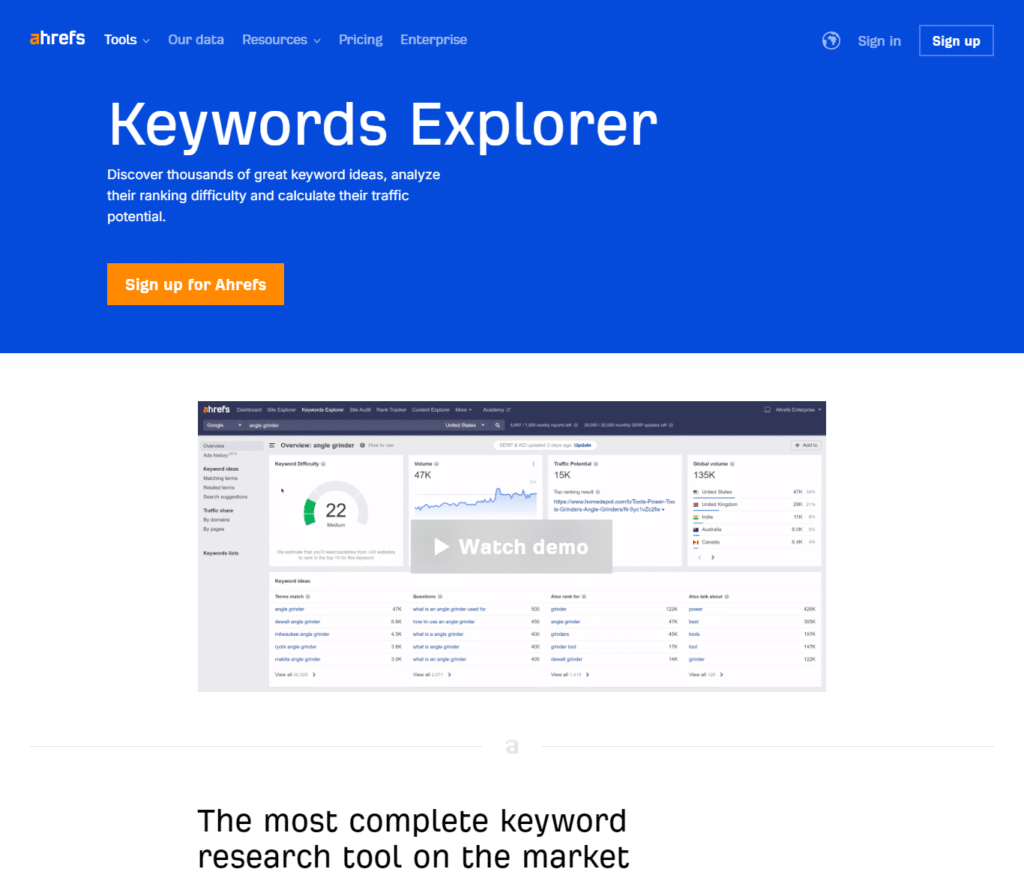
Image Source: Ahrefs
Key Features🌟
- Keyword Explorer: Ahrefs Keyword Explorer allows users to discover new keywords by entering seed keywords or phrases. It provides important metrics such as search volume, keyword difficulty, and the potential traffic a website can gain by ranking for a particular keyword.
- Competition Analysis: Analyze the top-ranking pages for any keyword to understand your competition. Check their SEO metrics and estimated monthly organic traffic.
- Search Volume and Clicks Data: Ahrefs provides insights into monthly search volumes for specific keywords, helping users understand the potential traffic they can attract. Additionally, it offers click-through rate (CTR) estimates, indicating the percentage of clicks organic search results might receive.
- Keyword Difficulty (KD) Score: Ahrefs calculates a Keyword Difficulty score to help users assess the competitiveness of a keyword. Higher scores indicate more challenging keywords to rank for.
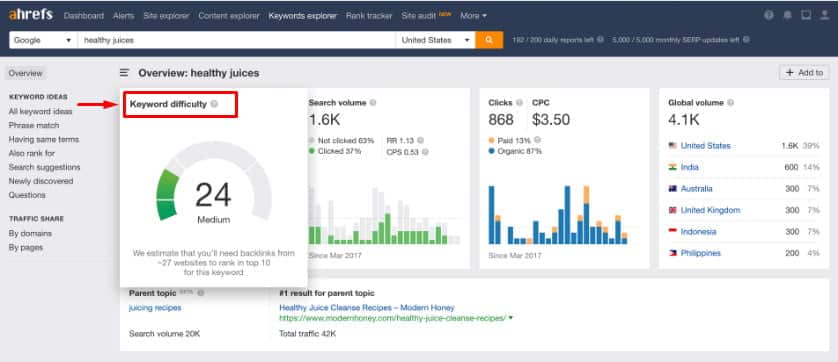
Image Source: Ahrefs
- SERP Overview: Users can view the top-ranking pages for a particular keyword, along with important metrics like the number of backlinks, referring domains, and the social shares of these pages.
- Advanced SEO Metrics: Get SEO metrics: return rate, clicks per search, percentage of clicks, percentage of paid clicks, and more!
- Content Gap Analysis: Ahrefs allows users to identify content gaps by comparing the keywords their site ranks for against competitors. This helps in finding opportunities to target new keywords.
- Clicks and Traffic Potential: A unique feature of Ahrefs is its ability to estimate the potential amount of traffic a website could receive if it ranks well for a given keyword.
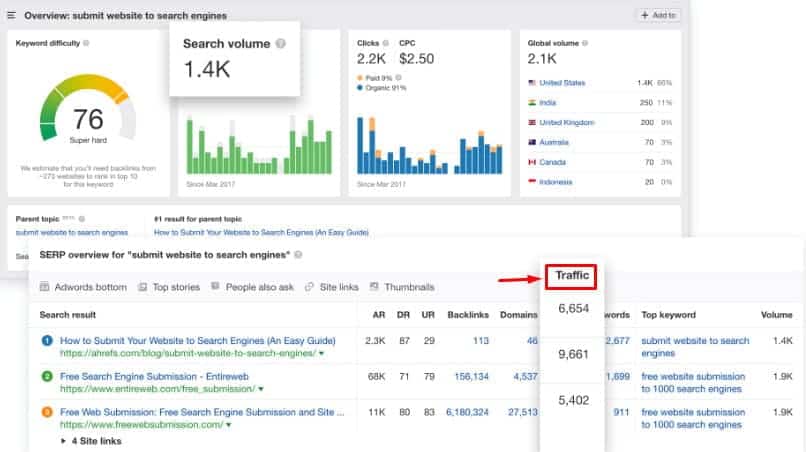
Image Source: Ahrefs
- Parent Topic and Related Keywords: Ahrefs provides information on the parent topic of a keyword and suggests related keywords, helping users build comprehensive content around a particular subject.
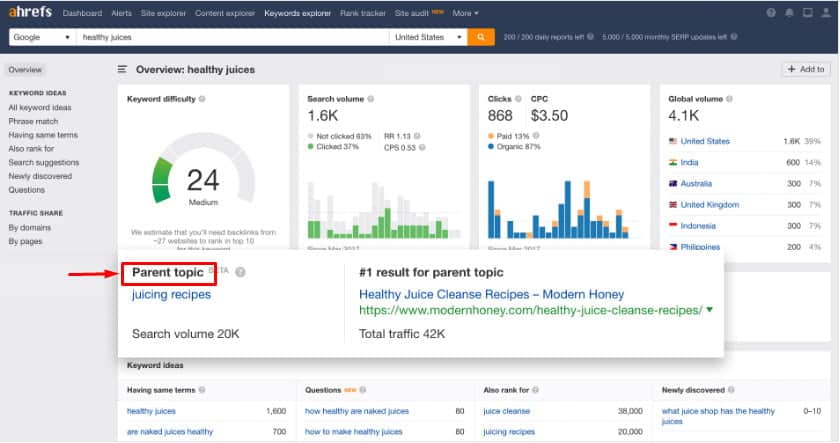
Image Source: Ahrefs
- Advanced Filtering and Sorting: Users can apply various filters and sorting options to refine their keyword research, making it easier to find relevant and high-potential keywords.
- Local Keyword Research: Ahrefs supports local SEO by providing data on location-specific keyword metrics, helping businesses target keywords relevant to their geographic audience.
- Historical Keyword Data: Users can track the historical performance of keywords, including changes in search volume and rankings over time.
- Beyond Google: Ahrefs goes beyond Google and allows you to research keyword ideas on eight other search engines, including YouTube, Bing, Yahoo, Amazon, Baidu, Daum, Naver, and Seznam.
- Amazon Keyword Tool: If you’re selling products on Amazon, Ahrefs offers an Amazon Keyword Tool.
- Keyword Lists: You can save and segment keywords into lists for future reference.
- Free Keyword Generator Tool: This tool allows you to find over 100 keyword ideas in seconds. You can input up to ten words or phrases, and it generates relevant keyword suggestions based on Google, Bing, YouTube, and Amazon searches.

Image Source: Ahrefs
You can choose from six different keyword ideas reports, including
- Keywords containing your seed in the order it’s written
- Phrase match
- Having the same terms
- Also ranking for
- Search suggestions
- Questions
These reports assist in showcasing keyword-rich topics for various durations, such as weeks, months, or even years, in your content calendar.
Pros and Cons✅/❌
✅Pros:
- Multi-Search Engine Data: Ahrefs provides data for nine search engines, not just Google.
- Website Flexibility: Ahrefs offers website flexibility, allowing it to work with more websites than competitors.
- User-Friendly Interface: Ahrefs has an intuitive and user-friendly interface, making it accessible to both beginners and experienced SEO professionals.
- Super-Local Keyword Tracking: You can track keyword rankings at a super-local level, which is beneficial for businesses targeting specific geographic areas.
- Traffic Potential Metric: Ahrefs provides a “traffic potential” metric, allowing the prioritization of keywords based on their potential impact on website traffic.
- Frequent Updates and Improvements: Ahrefs is known for actively updating and improving its features, staying relevant in the ever-evolving field of SEO.
❌Cons:
- Pricing: Higher than other tools, potentially disadvantageous for small businesses or budget-conscious website owners.
- Learning Curve: Advanced features may pose a learning challenge for beginners.
- Limited Free Trial: The trial period is not full-featured, subscription is required for complete features.
Statistics📊
- 7 billion keywords, updated with fresh data every month.
- Ahrefs Keywords Explorer gives you data for 171 countries.
- Get up to 10,000 keyword ideas with accurate search volume numbers.
- Ahrefs can estimate keyword volumes for 10 different search engines
- 64% of SEO professionals trust Ahrefs’ link data over its competitors.
- 67% of SEO professionals use Ahrefs’ domain rating as their SEO metric of choice.
- 10+ years of crawling the web to collect and process petabytes of data every day.
Note: The above statistical information has been taken from Ahrefs’s official website.
Pricing Plan💰
Ahrefs offers various pricing plans tailored to different needs. While specific pricing can change over time, it generally includes options like Lite, Standard, Advanced, and Enterprise plans. Each plan unlocks a different set of features, allowing you to choose what suits your blogging aspirations and budget.

Image Source: Ahrefs
Note: The above plan is a monthly pricing plan. The pricing plan can be changed at any time. For more and updated information, please visit the Ahrefs pricing page.
In a nutshell, bloggers, if you’re scouting for the best keyword research tools for bloggers in 2024, Ahrefs is waving from the top of the mountain. It’s not just about finding keywords; it’s about arming yourself with the tools to climb to new heights in the blogging world. Ready to let Ahrefs be your guide? Let’s embark on this keyword journey together!
You May Read:
- How to Install and Activate Astra Theme
- How to Install and Set Up Elementor Pro
- Ezoic WordPress Plugin Installation and Optimization
Ubersuggest
In the grand journey of discovering the best keyword research tools for bloggers,’ Ubersuggest emerges as the friendly companion, simplifying the process, providing a seamless interface, and turning the tales of untapped niches into reality. It’s not just a tool; it’s a bridge to the undiscovered possibilities in the blogging universe.
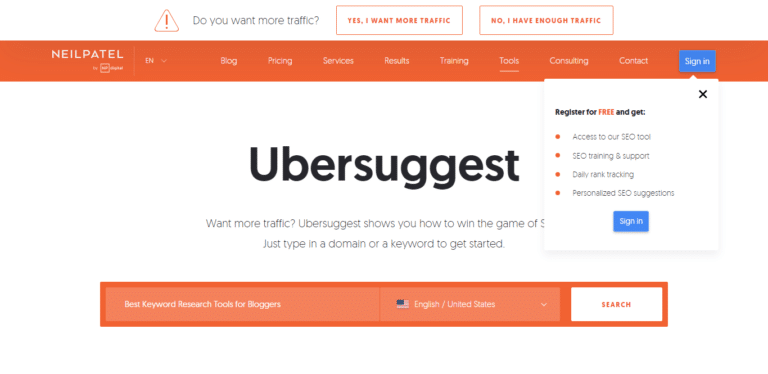
Image Source: Ubersuggest
Key Features🌟
- Keyword Suggestions: Ubersuggest provides keyword suggestions based on the seed keyword you enter. It gives you a list of related keywords along with their search volume, CPC (Cost Per Click), and competition metrics.
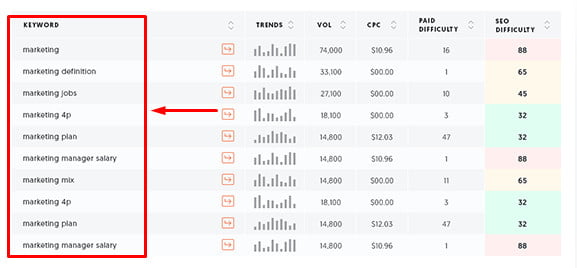
Image Source: Ubersuggest
- Search Volume Data: Users can view the monthly search volume for a specific keyword, helping them understand the popularity and potential reach of a particular term.
- Keyword Difficulty (KD): Ubersuggest offers a metric called Keyword Difficulty, which estimates how hard it would be to rank for a particular keyword. This metric helps users assess the competition level for specific keywords.
- Content Ideas: Ubersuggest suggests content ideas related to your keyword, helping you come up with topics that are relevant and potentially popular.
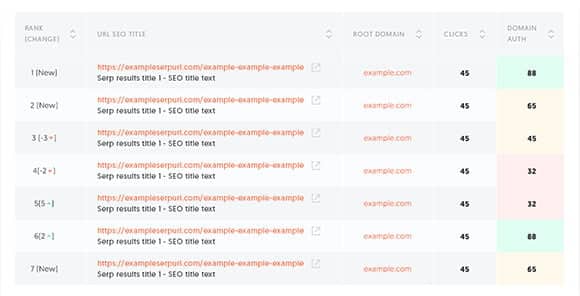
Image Source: Ubersuggest
- Competitor Analysis: Users can enter a competitor’s domain to see which keywords they are ranking for. This feature can provide insights into the competitor’s SEO strategy and help you identify opportunities for your own content.
- SEO Audit: Ubersuggest offers a basic SEO audit tool that provides an overview of your website’s SEO health. It highlights issues that may affect your site’s performance in search engines.
- Site Traffic Analysis: Users can get an estimate of a website’s monthly traffic, top pages, and other relevant metrics.
- Historical Data: Ubersuggest provides historical data for keywords, allowing users to see trends in search volume over time.
- Local SEO Data: For businesses targeting local markets, Ubersuggest provides local keyword data and suggests relevant keywords for local SEO.
- Content Analyzer: Ubersuggest’s content analyzer tool helps users analyze the content on their website and suggests improvements to enhance SEO.
Pros and Cons✅/❌
✅Pros:
- Domain Overview: Ubersuggest allows you to analyze competitors, view their ranking keywords, and explore their backlinks.
- User-Friendly Interface: The tool is known for its intuitive and user-friendly interface, making it accessible for both beginners and experienced SEO professionals.
- Competitor Analysis: Users can analyze competitors’ websites to understand their strategies, identify top-performing pages, and uncover keywords driving traffic to their sites.
- Content Ideas: Ubersuggest offers content ideas based on popular topics and trending keywords, assisting users in creating engaging and relevant content.
- Keyword Suggestions: Ubersuggest provides a keyword research tool to find relevant keyword ideas.
- Error Reports: It alerts you to website errors and offers guidance on fixing them.
- Tracking: Keep tabs on your website’s performance and keyword rankings.
- Historical Data: Ubersuggest provides historical data for domains, allowing users to track changes in organic search performance over time.
- Add-On Availability: Ubersuggest provides add-ons for browsers like Chrome and Firefox.
- Cost-Effective: Ubersuggest won’t burn a hole in your pocket, making it perfect for bloggers on a budget.
❌Cons:
- Free Version Limitations: While Ubersuggest offers a helpful free version, it has some limitations.
- Keyword Difficulty Accuracy: The keyword difficulty metric may not always accurately reflect the actual difficulty of ranking for a particular keyword. It’s advisable to use this metric along with other factors.
Pricing Plan💰
Now, let’s talk about the investment. Ubersuggest provides various pricing plans, like Business, Individual, and Enterprise, tailored to different needs.
- Ubersuggest offers two types of plans: monthly and lifetime.
- With a 7-day free trial, you can take it for a spin before committing.
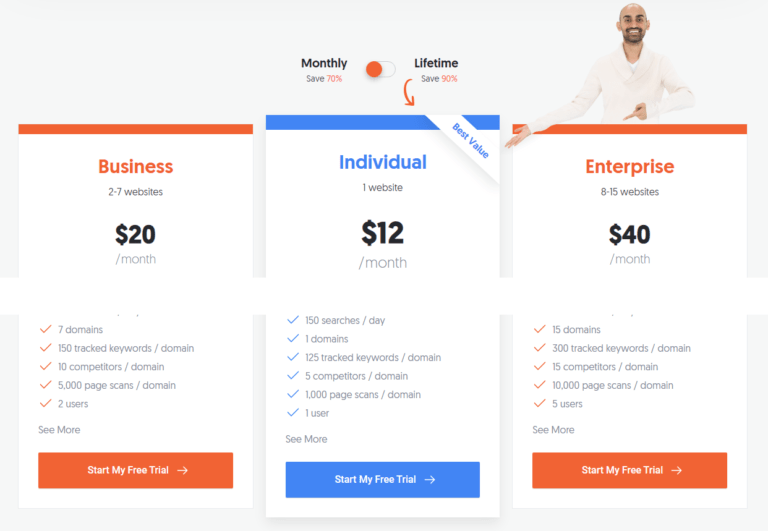
Image Source: Ubersuggest
Note: The above plan is a monthly pricing plan. The pricing plan can be changed at any time. For more and updated information, please visit the Semrush pricing page.
In summary, Ubersuggest is the solution if you’re searching for a keyword research tool that not only makes the process easier but also reveals untapped prospects. It’s not just about keywords; it’s about giving bloggers the tools they need to explore, innovate, and thrive in the dynamic world of blogging.
In the grand quest for the best keyword research tools for bloggers in 2024, let Ubersuggest be the compass that leads you to your blogging treasures.
Further Reading:
Moz Keyword Explorer
In the bustling universe of the best keyword research tools for bloggers, the MOZ Keyword Explorer tool stands tall, ready to unravel the mysteries of keywords in a language that resonates with bloggers. Let’s take a friendly stroll through its key features, weigh the pros and cons, delve into some interesting statistics, and peek into the pricing plan.
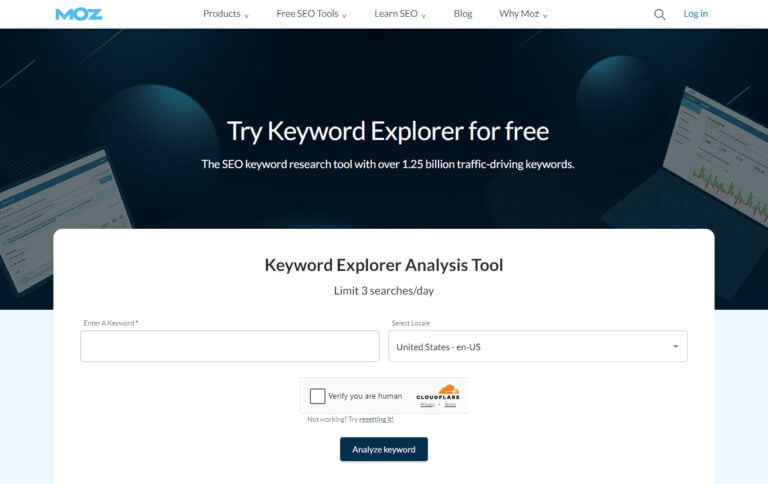
Image Source: MOZ
Key Features🌟
- Comprehensive Keyword Metrics: Get detailed insights into metrics such as search volume, keyword difficulty, and opportunity.
- SERP Analysis: Understand the Search Engine Results Page (SERP) for a specific keyword, including featured snippets, image results, and more.
- Categorization and Sorting: Easily organize and sort keywords based on relevance, search volume, or difficulty in streamlining your research.
- Competitor Analysis: Identify your competitors and understand their ranking strategies for specific keywords.
- Keyword Lists: Create and manage keyword lists to organize your research and streamline your content planning.
- Generates Relevant Keyword Suggestions: MOZ helps users discover new, relevant keywords related to their target topic.
- Preview SERP Features for Every Keyword: MOZ provides information on SERP features associated with each keyword.
- Explore Keywords by Site: It helps understand the competitive landscape and identify potential competitors’ keywords.
- Localized Data: Access keyword data tailored to specific locations, helping you target a local audience effectively.
- Historical Metrics: Track changes in keyword metrics over time to identify trends and patterns.
- Exportable Reports: Export comprehensive reports in various formats, making it easy to share insights or integrate them into your workflow.
- Keyword Filtering: Filter keywords based on specific criteria to focus on the most relevant and impactful terms for your content.
- Page Authority and Domain Authority: Assess the authority of specific pages or domains, providing insights into the competitive landscape.
- Keyword Lists for Campaigns: Create keyword lists tailored for specific campaigns, making it easier to track and manage performance.
- Performs Organic Keyword Analysis on Your Competitors: Moz Keyword Explorer enables users to conduct competitive analysis by examining the organic keywords that competitors are ranking for.
Pros and Cons✅/❌
✅Pros:
- Comprehensive Metrics: MOZ Keyword Explorer provides a wide array of metrics, including search volume, keyword difficulty, and opportunity, offering a holistic view of keyword performance.
- User-Friendly Interface: The tool is designed with a user-friendly interface, making it accessible for both beginners and experienced SEO professionals.
- SERP Analysis: The SERP analysis feature helps users understand the current landscape for specific keywords, allowing for more informed content creation and optimization.
- Competitor Insights: MOZ Keyword Explorer allows users to analyze competitors, providing valuable insights into their keyword strategies and helping users stay ahead in their niche.
- Historical Metrics: The ability to track changes in keyword metrics over time helps users identify trends and adapt their strategies accordingly.
❌Cons:
- Pricing Tiers: Access to advanced features in MOZ Keyword Explorer is available through paid plans, which might be a limitation for users on a tight budget.
- Limited Free Features: While MOZ offers some free features, the most powerful and detailed insights require a subscription, potentially limiting access for users who prefer free tools.
- Learning Curve: Despite its user-friendly interface, mastering all the features and leveraging the tool to its full potential may require some learning for beginners.
Statistics📊
- 1.25 billion keyword suggestions
- 180 million fresh ranking keywords
- 500,000+ SEOs who trust Moz’s quality data and insights to help their businesses grow.
- 44.8 trillion links are indexed by Link Explorer
- 100,000 Local business listings optimized with Moz Local
- 8 million SERPs analyzed daily by STAT
Note: The above statistical information has been taken from MOZ’s official website.
Pricing Plan💰
MOZ offers various pricing plans, like Standard, Medium, Large, and Premium, tailored to different needs, as follows:
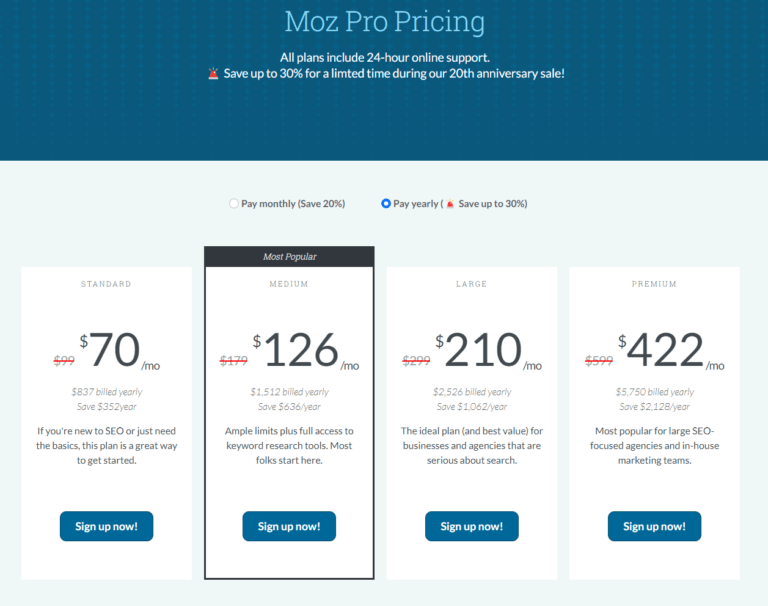
Image Source: MOZ
Note: The above plan is an annual pricing plan. The pricing plan can be changed at any time. For more and updated information, please visit the MOZ Pro pricing page.
In the realm of keyword research, MOZ Keyword Explorer stands out as a trustworthy companion, simplifying the complexities, providing actionable insights, and unveiling the stories of bloggers who mastered the art of keywords. As you navigate the sea of options in search of the best keyword research tools for bloggers, consider MOZ as your ally in the exciting world of blogging.
Further Reading:
Google Keyword Planner
In the quest for the best keyword research tools for bloggers, let’s shine a spotlight on the familiar and reliable Google Keyword Planner. Designed to be a blogger’s trusted companion, this tool speaks your language and simplifies the intricate world of keywords. Let’s unravel the charm of this tool.
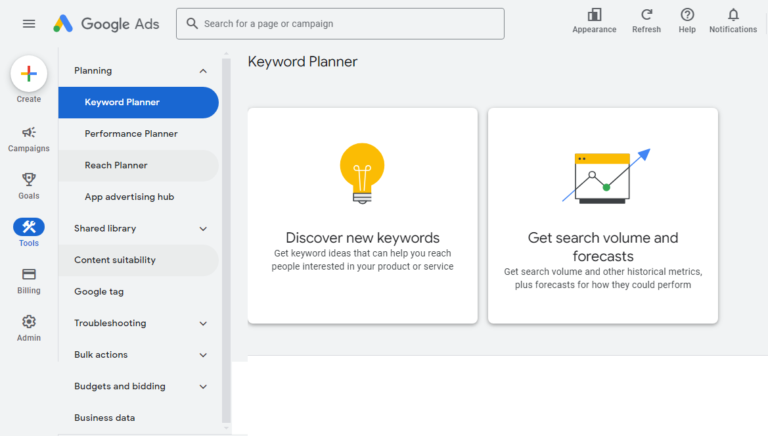
Image Source: Google Keyword Planner by Google Ads
Key Features🌟
- Keyword Research: The tool allows users to discover new keywords related to their products, services, or target audience. Provides historical statistics and trends for selected keywords.
- Keyword Suggestions: The tool offers keyword suggestions based on user-provided seed keywords, website content, or product categories.
- Search Volume Data: The tool provides estimated average monthly search volumes for selected keywords. Includes historical data to understand search volume trends over time.
- Competition Insights: It displays the level of competition for each keyword, helping advertisers assess the competitiveness of specific terms.
- Bid Estimates: It offers estimated bid amounts for keywords, aiding advertisers in budget planning for their Google Ads campaigns.
- Location and Language Targeting: The tool allows users to specify target locations and languages to tailor keyword suggestions and data to a particular geographic area.
- Filtering Options: The tool enables users to filter keyword suggestions based on criteria such as search volume, competition, and bid estimates.
- Ad Group Ideas: It suggests relevant ad groups based on selected keywords, helping users organize their campaigns effectively.
- Negative Keyword Recommendations: It recommends negative keywords to exclude from campaigns, ensuring that ads are not triggered for irrelevant searches.
- Customization and Export: Users can customize and export keyword lists, making it easier to integrate the data into their advertising strategies and campaigns.
- Integration with Google Ads: Seamless integration with Google Ads accounts allows users to directly incorporate chosen keywords into their advertising campaigns.
- Keyword Forecast: The tool offers a forecast based on your spending. It shows how many conversions, clicks, or impressions you’re likely to achieve for your chosen keywords.
- Campaign Planning: Once you’ve identified the keywords you like, you can add them to your advertising plan. You can save your plan or share it with others before finalizing and launching your campaign.
- Mobile App Integration: Stay connected to your campaigns on the go using the Google Ads Mobile App. Monitor your campaigns in real-time and take quick actions to improve performance.
Pros and Cons✅/❌
✅Pros:
- Integration with Google Ads: Seamlessly integrates with Google Ads, allowing users to easily transfer selected keywords into their ad campaigns.
- Comprehensive Keyword Data: Provides extensive data on keyword search volume, competition, and bid estimates, helping advertisers make informed decisions.
- Free to Use: Google Keyword Planner is free for anyone with a Google Ads account, making it accessible to a wide range of users.
- Location and Language Targeting: This allows users to target specific geographic locations and languages, providing more relevant keyword suggestions.
- Historical Data: Offers historical data, allowing users to analyze trends and changes in keyword performance over time.
- User-Friendly Interface: It features a user-friendly interface, making it accessible for both beginners and experienced advertisers.
❌Cons:
- Limited Precision: While it gives search volume ranges, exact search numbers are not provided. This lack of precision can be frustrating for advertisers.
- May Encourage Higher Bids: Bid estimates provided may sometimes encourage higher bids, and users should carefully evaluate their own budget constraints and goals.
- Requires a Google Ads Account: To use Keyword Planner, you must have an active Google Ads account. Some users find this requirement restrictive.
- Focused on Ads: While it’s a powerful tool for advertisers, bloggers might find some features more tailored to paid campaigns.
Pricing Plan💰
- Free Access: Google Keyword Planner is available for free to anyone with a Google Ads account, making it a cost-effective option for bloggers.
- Ad Spend for Advanced Features: While the tool is free, accessing certain advanced features may require running Google Ads campaigns, with costs associated with ad spend.
In the expansive landscape of keyword research, Google Keyword Planner stands as a reliable companion, offering insights, suggestions, and a glimpse into what people are searching for. As you navigate the realm of the best keyword research tools for bloggers, consider Google Keyword Planner as a trustworthy guide in your blogging journey.
Further Reading:
Mangools KWFinder
In the vibrant universe of “Best Keyword Research Tools for Bloggers,” Mangools KWFinder emerges as a friendly guide, simplifying the journey to discover impactful keywords. Let’s delve into this tool in a conversational tone.
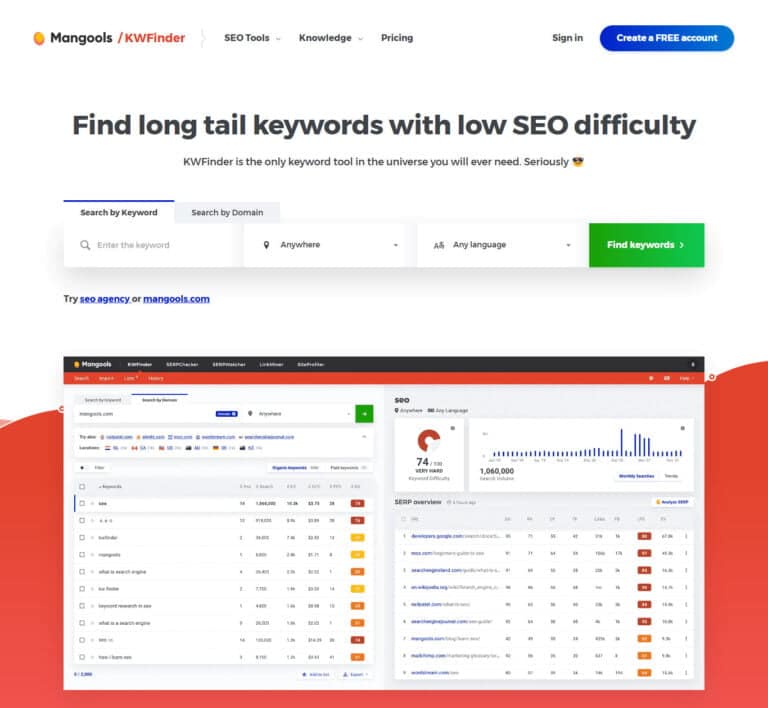
Image Source: Mangools KWFinder
Key Features🌟
- Find Hidden Long Tail Keywords: KWFinder helps you discover those less competitive, longer phrases that can drive targeted traffic to your website.
- Competitor Keyword Analysis: Uncover the keywords your competitors are ranking for. This insight allows you to strategize and optimize your content effectively.
- Google Suggest Keyword Source: Leverage Google’s autocomplete suggestions to identify relevant keywords and topics.
- Organize Keywords with Lists: KWFinder lets you create keyword lists for better organization and management.
- Bulk Keyword Import: Easily import a large number of keywords at once for efficient analysis.
- Profitability Filtering: Filter out keywords that may not yield significant results, ensuring you focus on the most valuable ones.
- Local Keyword Research: Tailor your keyword research to specific geographic regions for localized SEO efforts.
- Accurate Keyword Difficulty: KWFinder provides precise keyword difficulty scores, helping you choose the right keywords for your content.
- Search Volume and Metrics: Get insights into search volumes and other essential metrics to make informed decisions.
- SERP Analysis and SEO Metrics: Analyze search engine results pages (SERPs) and track relevant SEO metrics.
- Keyword Planner Alternative: KWFinder offers an alternative to Google’s Keyword Planner, making it a versatile tool for keyword research.
Pros and Cons✅/❌
✅Pros:
- User-Friendly Interface: KWFinder has an intuitive and user-friendly interface, making it easy for both beginners and experienced users to navigate and use the tool effectively.
- Keyword Difficulty Score: One of KWFinder’s standout features is its keyword difficulty score, which helps users assess the competitiveness of a keyword. This can be valuable for choosing keywords that are easier to rank for.
- Accurate Search Volume Data: KWFinder provides accurate search volume data for keywords, helping users understand the popularity of specific terms.
- Localized Search: It allows users to perform localized keyword research, enabling them to target specific regions or countries.
- SERP Analysis: KWFinder offers SERP (Search Engine Results Page) analysis, providing insights into the current top-ranking pages for a particular keyword. This information can help users understand their competition.
- Keyword Suggestions: The tool generates relevant keyword suggestions, expanding your list of potential keywords and topics.
- Competitive Analysis: KWFinder enables users to analyze the SEO metrics of their competitors, helping them identify opportunities and gaps in their strategies.
❌Cons:
- Limited Daily Searches for Free Users: The free version of KWFinder has limitations on the number of daily searches, which may be restrictive for users with extensive keyword research needs.
- Pricing: While KWFinder offers a free version, its full suite of features comes with a subscription cost. Some users may find the pricing relatively higher compared to other keyword research tools in the market.
Statistics📊
- 2.5 billion related keywords. 20 million monthly growing
- 100 million competitor keywords checked each month
- 52k supported locations cities, districts, and countries
- More than 25,000 paying customers
Note: The above statistical information has been taken from Mangools KWFinder’s official website.
Pricing Plan💰
Mangools offers different pricing plans, like Mangools Entry, Basic, Premium, and Agency, as per the users’ needs. They also provide a free trial with a 48-hour money-back guarantee.
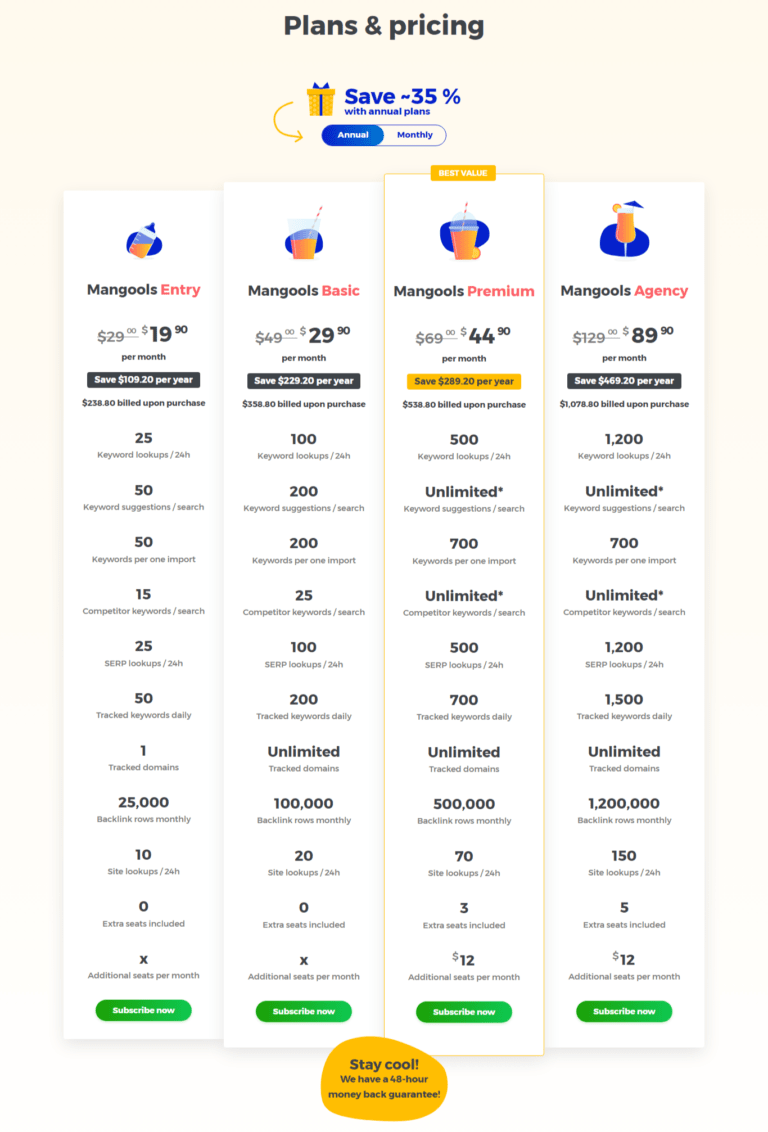
Image Source: Mangools KWFinder
Note: The above plan is an annual pricing plan. The pricing plan can be changed at any time. For more and updated information, please visit the Mangools KWFinder pricing page.
In the symphony of keyword research, Mangools’ KWFinder plays a delightful tune for bloggers, simplifying the process, providing actionable insights, and turning the exploration of keywords into a magical experience. As you waltz through the landscape of the best keyword research tools for bloggers, consider KWFinder as your reliable dance partner in the realm of blogging discovery.
You May Read:
SpyFu
In the enchanting realm of the best keyword research tools for bloggers, SpyFu emerges as a treasure map, guiding bloggers to discover hidden gems. Let’s embark on a friendly exploration of this tool.
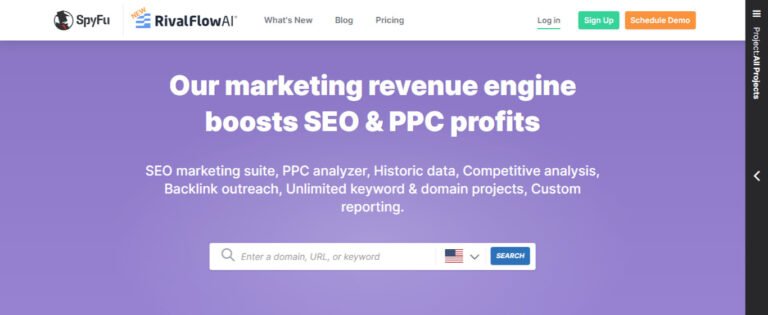
Image Source: SpyFu
Key Features🌟
- Keyword Research: SpyFu allows users to discover relevant keywords related to their niche or industry. It provides insights into the search volume, cost-per-click (CPC), and competition for specific keywords.
- Competitor Analysis: SpyFu specializes in competitor analysis, enabling users to see the keywords their competitors are targeting. Users can gain insights into the organic and paid search strategies of competitors.
- Ad Copy and PPC Competitor Analysis: SpyFu provides information on the ad copies used by competitors in their PPC (Pay-Per-Click) campaigns. It shows historical data on ad spend, ad positions, and the performance of competitors’ ads.
- SEO Competitor Analysis: Users can analyze the organic search strategies of competitors, including the keywords they rank for and their backlink profiles.
- Keyword Grouping and Organization: SpyFu helps users organize and group keywords efficiently, making it easier to manage and optimize campaigns.
- SERP Analysis: Users can view and analyze search engine results pages (SERPs) for specific keywords, including the top-ranking pages and their SEO metrics.
- Domain Overview: SpyFu provides a comprehensive overview of a domain, including its organic and paid search performance, top keywords, and competitors.
- Reporting and Exporting: Users can generate reports based on the data collected from SpyFu, facilitating easy sharing of insights with team members or clients. Exporting capabilities allow users to download data for further analysis or integration with other tools.
- Keyword Tracking: SpyFu offers features to track the performance of selected keywords over time, allowing users to monitor changes and adjust their strategies accordingly.
Pros and Cons✅/❌
✅Pros:
- User-Friendly Interface: Many users find SpyFu’s interface to be user-friendly and easy to navigate, even for those new to keyword research and competitive analysis.
- Competitor Insights: SpyFu excels in providing detailed information about competitors’ keyword strategies, ad copies, and organic search performance, helping users gain a competitive edge.
- Comprehensive Data: The tool offers a wide range of data, including search volume, CPC, competition level, and historical performance data for both organic and paid searches.
- PPC Ad Insights: Users can analyze competitors’ PPC ad strategies, including ad copies, ad spend estimates, and ad positions, providing valuable insights for improving their own paid campaigns.
- Historical Data: SpyFu provides historical data, allowing users to track changes in keyword performance and advertising strategies over time.
❌Cons:
- High pricing for advanced features, requiring cost-benefit analysis.
- Extensive features may pose a learning curve for new users. Training resources and support are available, but functional understanding may take time.
- Limited data for niche or smaller markets, potentially limiting coverage.
Statistics📊
- 200K Monthly Users
- 10+ years of historical data
Note: The above statistical information has been taken from SpyFu’s official website.
Pricing Plan💰
SpyFu offers various pricing plans with a 30-day money-back guarantee, as per users’ needs:
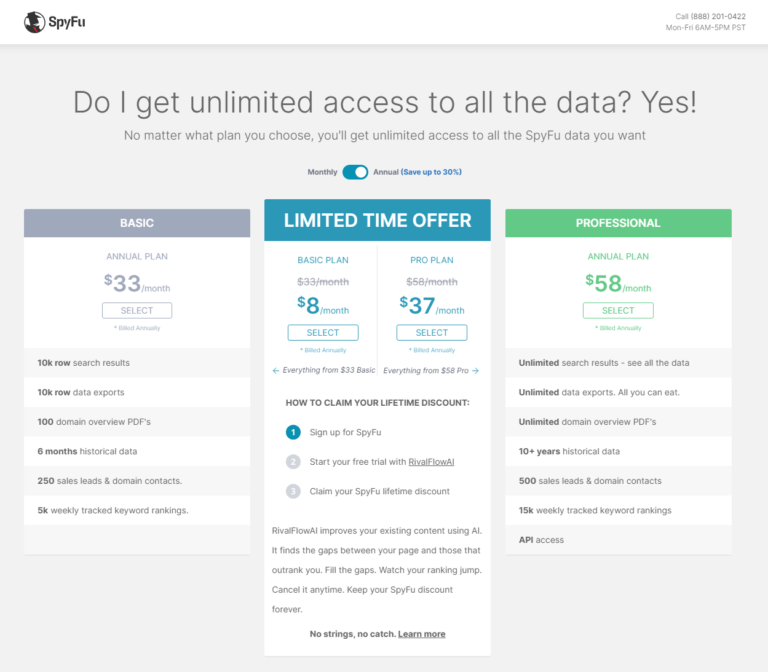
Image Source: SpyFu
Note: The above plan is an annual pricing plan. The pricing plan can be changed at any time. For more and updated information, please visit the SpyFu pricing page.
As you navigate the landscape of the best keyword research tools for bloggers, think of SpyFu as your secret ally, guiding you through the intricacies of keywords and helping you uncover the hidden secrets of successful blogging. Embrace the detective within, and let SpyFu be your partner in the exciting journey of keyword discovery.
Further Reading:
Long Tail Pro
Welcome to the next chapter of our exploration of the best keyword research tools for bloggers as we dive into the depths with Long Tail Pro. This tool acts as a treasure map, uncovering hidden gems among the keywords for bloggers. Let’s uncover it!
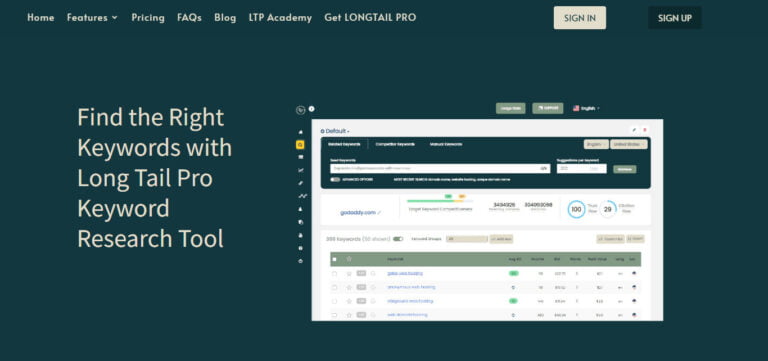
Image Source: Long Tail Pro
Key Features🌟
- Comprehensive Keyword Research: Long Tail Pro excels in providing comprehensive keyword research, helping you uncover long-tail keywords that are less competitive yet highly relevant to your niche.
- Competitor Analysis: Gain insights into your competitors’ keyword strategies and identify opportunities for differentiation and optimization.
- Long-Tail Keyword Suggestions: Long Tail Pro specializes in uncovering long-tail keyword opportunities, helping you find less competitive yet highly relevant keywords for your niche.
- Rank Tracking: Keep track of your keyword rankings over time, allowing you to monitor the performance of your content and make informed decisions about your SEO strategy.
- SERP Analysis: The tool provides a SERP analysis feature that allows users to view the top-ranking pages for a given keyword. Users can analyze factors such as page title, meta description, and backlink profile to understand why certain pages are ranking well.
- Search Volume and Keyword Difficulty: Understand the search volume and difficulty of keywords, enabling you to prioritize your content creation efforts effectively.
- Customizable Dashboards and Reports: LongTail Pro offers customizable dashboards and reporting features, allowing users to track their keyword rankings and other metrics in a visually appealing format.
Pros and Cons✅/❌
✅Pros:
- Specialization in Long-Tail Keywords: Long Tail Pro’s focus on long-tail keywords sets it apart, making it an invaluable tool for bloggers aiming to target specific niches.
- User-Friendly Interface: The tool is designed with ease of use in mind, ensuring that bloggers of all skill levels can navigate and utilize its features effectively.
- Comprehensive Data: From keyword suggestions to search volume and difficulty metrics, Long Tail Pro provides comprehensive data to inform your content strategy.
❌Cons:
- Limited Free Features: While Long Tail Pro offers some free features, access to advanced features and data may require a paid subscription.
- Learning Curve: While user-friendly, new users may need some time to familiarize themselves with all the features and functionalities of Long Tail Pro.
Statistics📊
- Over 70,000 Marketers use Long Tail Pro
- You can get up to 400 long tail keywords from a single seed keyword within seconds.
Note: The above statistical information has been taken from Long Tail Pro’s official website.
Pricing Plan💰
LongTail Pro offers various pricing plans like, Startar, Pro and Agency as follows:

Image Source: Long Tail Pro
Note: The pricing plan can be changed at any time. For more and updated information, please visit the LongTail Pro pricing page.
In a nutshell, in the world of the best keyword research tools for bloggers, LongTail Pro is a significant keyword research tool in your blogger toolkit. With its robust features and user-friendly interface, you’ll dominate the search results quickly!
You May Read:
Keyword Surfer By Surfer SEO
Next up in our exploration of the best keyword research tools for bloggers is Keyword Surfer by Surfer SEO. Picture yourself as a surfer, catching waves of keywords to propel your blog to new heights. Let’s dive into this tool!
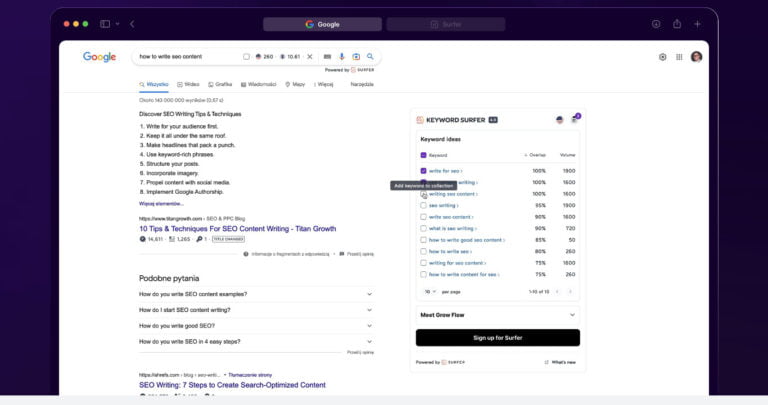
Image Source: Surfer SEO
Key Features🌟
SERP Analyzer:
This is the core feature of Keyword Surfer. It provides an in-depth breakdown of Google’s first page search engine results pages (SERPs) for a given keyword. Here’s what you get:
- Average word count (content length)
- Keyword density and frequency
- Use of partial match keywords
- Hidden Content
- Page speed
- Character count in title tags
- And much more!
Keyword Research:
Keyword Surfer allows you to generate keyword ideas and view search volumes directly within Google search results. For each new search, you’ll uncover valuable insights, including:
- Search volume
- Cost per Click (CPC)
- Related terms
- Visibility metrics
- On-page data
You can even create keyword collections to bookmark important keywords without leaving the search results page.
Content and Keyword Research:
Beyond search volume, Keyword Surfer helps you:
- Discover related keywords
- Focus on geographic area-specific searches (great for local SEO)
- Estimate traffic data related to keywords
- Identify high-ranking pages for your search queries
- Generate content based on your target keywords
Pros and Cons✅/❌
✅Pros:
- Provides real-time data on SERP, including search volume and CPC for any keyword.
- Generates a list of related keywords and variations, and shows SERP ranking percentages for these keywords.
- Displays word counts of all ranking articles for optimizing content length and alignment with top-performing pages.
- Allows creation of custom keyword collections, saving unlimited keywords for future analysis.
- Offers seamless integration with Google Docs, providing content scores, improvement suggestions, and other essential data within the document.
❌Cons:
- Limited Advanced Features: Some advanced features may be lacking compared to other keyword research tools, which could be a drawback for bloggers with more complex needs.
- Learning Curve for Beginners: While user-friendly, new users might need some time to explore and fully utilize all the features offered by Keyword Surfer.
Statistics📊
- 18 645+ customers from 159+ countries and over 233 422 active users.
- Surfer Support is always happy to help. 97.1% satisfaction rate!
Note: The above statistical information has been taken from Surfer SEO’s official website.
Pricing Plan💰
Surfer SEO offers various pricing plans, like Essential, Scale, Scale AI, and Enterprise, tailored to different needs, as follows:
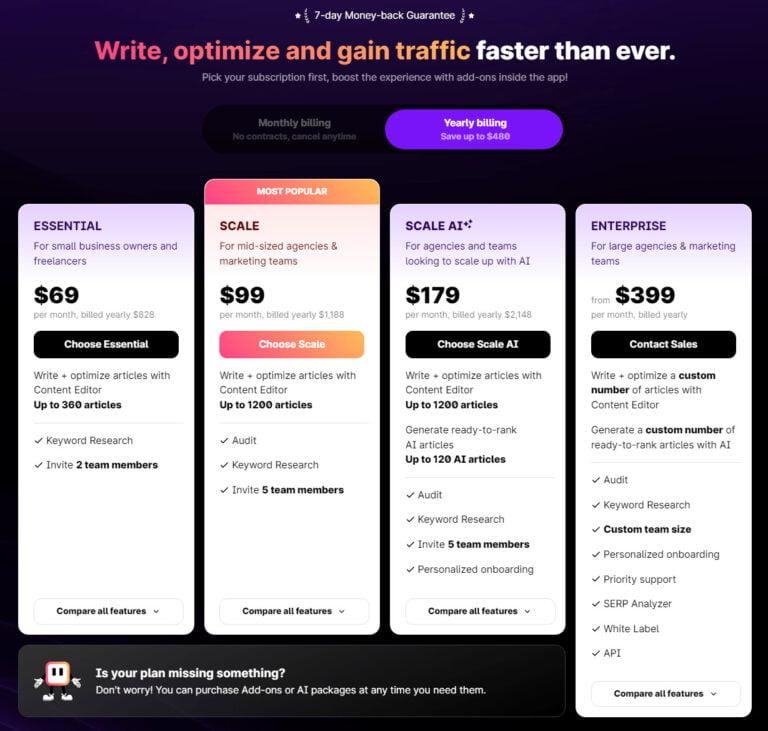
Image Source: Surfer SEO
Note: The above plan is an annual pricing plan. The pricing plan can be changed at any time. For more and updated information, please visit the Surfer SEO pricing page. A 7-day money-back guarantee is available.
In summary, embark on a journey with us to explore the best keyword research tools for bloggers in 2024 as we set our sights on Keyword Surfer by Surfer SEO. This tool acts as your trusty compass, guiding you through the vast ocean of keywords.
Further Reading:
Serpstat
As we continue our exploration of the best keyword research tools for bloggers in 2024, let’s set sail with Serpstat. Think of it as your trusty compass in the vast landscape of keywords, helping you navigate and discover the right path for your blogging journey. Let’s explore!
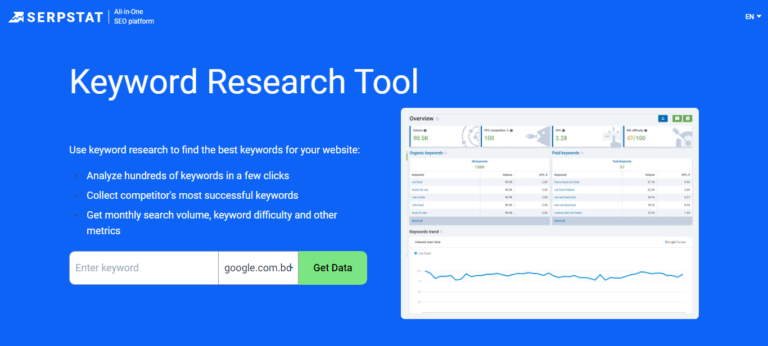
Image Source: Serpstat
Key Features🌟
Keyword Research Tool:
- Use Serpstat’s keyword research tool to discover the best keywords for your website.
- Analyze hundreds of keywords with just a few clicks.
- Collect your competitors’ most successful keywords.
- Get essential metrics such as monthly search volume and keyword difficulty.
- Serpstat provides data from 230 Google databases of keywords and keyword suggestions, totaling over 7 billion keywords.
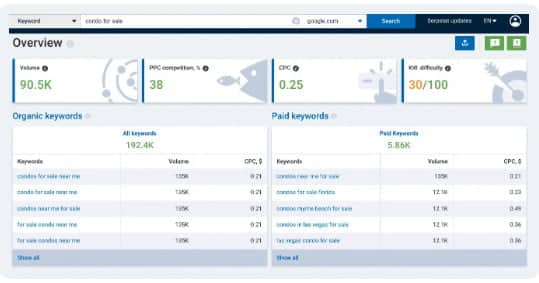
Image Source: Serpstat
Keyword Niche Finder:
- Dive into your niche using Serpstat’s niche research tool and SEO site analyzer.
- Explore related keywords and terms commonly used alongside your primary keywords.
- Research your competition in both paid and organic search.
- Uncover valuable insights to optimize your content strategy
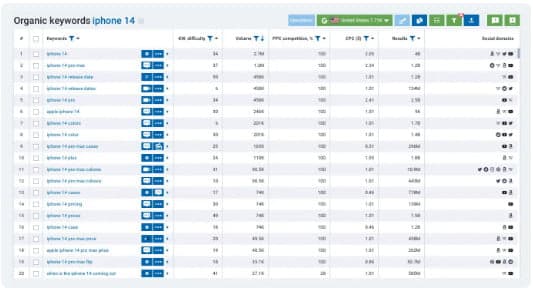
Image Source: Serpstat
Keyword Clustering Tool:
- Upload up to 50,000 keywords to Serpstat’s clustering tool.
- Automatically group keywords based on SERP similarity.
- Enhance your website’s rankings and SEO by adding keyword clusters to relevant pages.
- Compare keyword volumes and connection strength, and manage clusters manually.
- Export keyword clusters for further analysis
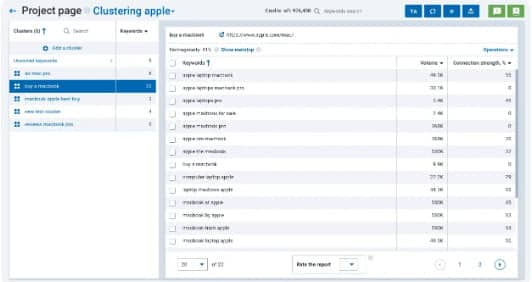
Image Source: Serpstat
Keyword Analysis:
- Find relevant keywords related to your niche or industry.
- Analyze search volume and competition for selected keywords.
- Identify long-tail keywords and variations.
Search Volume and CPC Data:
- Access information on search volume to understand the popularity of keywords.
- View Cost-Per-Click (CPC) data for paid advertising insights.
Competition Analysis:
- Analyze the competition for specific keywords.
- Identify competing domains and pages for targeted keywords.
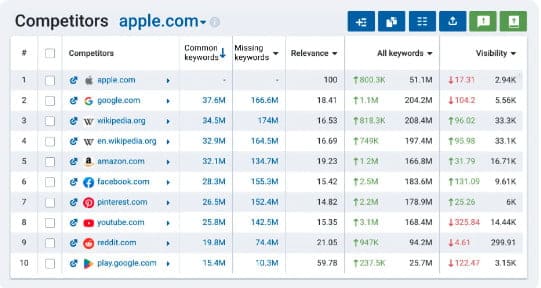
Image Source: Serpstat
Keyword Difficulty:
- Evaluate the difficulty of ranking for specific keywords.
- Get insights into the level of competition for selected keywords.
Rank Tracking:
- Monitor the ranking performance of your website for selected keywords.
- Track changes in search engine rankings over time.

Image Source: Serpstat
Pros and Cons✅/❌
✅Pros:
Comprehensive Keyword Research:
- Serpstat provides a robust keyword research tool that allows you to explore and analyze a wide range of keywords.
- You can uncover valuable insights about search volume, keyword difficulty, and related terms.
Niche Exploration:
- The Keyword Niche Finder feature helps you dive deep into your niche.
- Discover related keywords commonly used alongside your primary ones.
- Gain a competitive edge by understanding your niche thoroughly.
Keyword Clustering:
- Serpstat’s Keyword Clustering Tool enables you to organize and group keywords effectively.
- Automatically cluster keywords based on their similarity in search engine results pages (SERPs).
- Optimize your content strategy by adding relevant keyword clusters to specific pages.
Trusted Data Sources:
- Serpstat draws data from 230 Google databases, providing a wealth of keyword information.
- It also includes a new database for Bing United States, expanding its reach.
Professional Endorsements:
- Digital marketing experts and strategists appreciate Serpstat’s capabilities.
- From site audits to competitor insights, professionals rely on Serpstat for their SEO needs.
❌Cons:
Learning Curve:
- Like any powerful tool, Serpstat may have a learning curve for beginners.
- Users need to explore its features thoroughly to maximize its potential.
Pricing Tiers:
- While Serpstat offers a free version, its more advanced features come with subscription plans.
Statistics📊
- 7.03 billion keywords
- 4.54 billion keyword suggestions
- 230 Google databases of keywords and keyword suggestions.
- 1.97 billion Keywords in SERPs
Note: The above statistical information has been taken from Serpstat’s official website.
Pricing Plan💰
Serpstat provides different pricing plans, like Individual, Team, and Agency according to your needs. Besides, Serpstat offers a custom plan for big enterprises that have specific demands. A 7-day free trial is available.
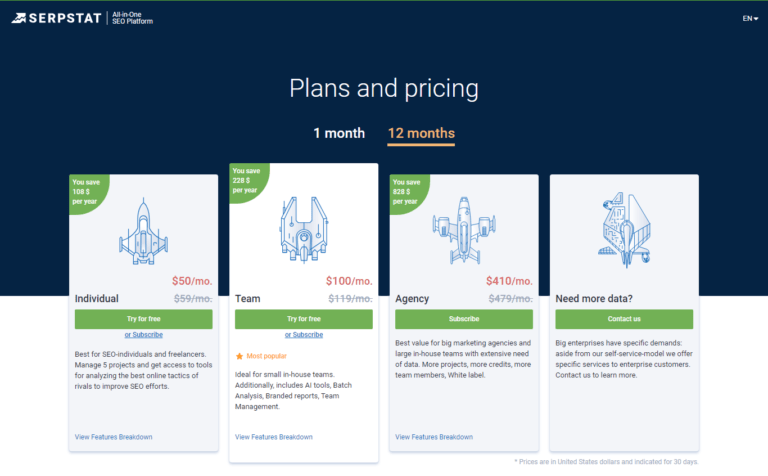
Image Source: Serpstat
Note: The above plan is an annual pricing plan. The pricing plan can be changed at any time. For more and updated information, please visit the Serpstat pricing page.
In the vast landscape of the best keyword research tools for bloggers, Serpstat stands out as a reliable guide, offering not just keywords but a holistic approach to SEO. It’s like having a versatile toolkit for your blogging adventure.
Further Reading:
- How to Choose the Best Niche for Blogging with Low Competition
- How to Boost Your Website’s SEO with Keyword Research PHP Script
Final Words
As we wrap up our journey through the best keyword research tools for bloggers in 2024, let’s take a moment to recap the key points, emphasize the significance of these tools, and encourage you to dive into the world of keyword research with confidence.
We’ve explored the best keyword research tools like Semrush, Ahrefs, Ubersuggest by Neil Patel, MOZ Keyword Explorer, Google Keyword Planner, Mangools KWFinder, and the SpyFu keyword research tool. Each tool has its own unique strengths, from user-friendly interfaces to in-depth competitor analysis. Whether you’re a seasoned blogger or just starting, there’s a tool waiting to be your ally.
The heartbeat of successful blogging lies in understanding what your audience is searching for. Keyword research tools are your compass, guiding you through the vast content universe. They unveil trends, reveal untapped niches, and empower you to create content that resonates with your audience.
Now, it’s your turn to embark on this keyword exploration journey. Are you ready to elevate your blogging game? Dive into the recommended tools and witness the transformation in your content strategy. Whether you’re a seasoned blogger or just starting, these tools have something for everyone.
What are your thoughts on the best keyword research tools for bloggers in 2024? Share your experiences, insights, and questions in the comments below. Let’s create a space for discussions and learn from each other’s unique perspectives.
In the dynamic world of blogging, these keyword research tools are your companions, helping you navigate, explore, and thrive. Here’s to discovering the right keywords, crafting compelling content, and making your mark in the digital universe. Happy blogging!😊
Additional Resources: Your Bonus Toolkit!
As you venture into the vast landscape of the best keyword research tools for bloggers in 2024, here are some additional resources that can be your guiding light. These articles, books, and forums are like hidden treasures waiting to be explored on your blogging journey:
Blogs and Articles:
- Moz Blog: Packed with in-depth articles on all things SEO, including keyword research strategies and tips specifically for bloggers.
- Backlinko: Brian Dean’s blog is a treasure trove of SEO knowledge, with actionable guides and case studies on keyword research.
- Search Engine Land: Stay updated on the latest SEO trends and news with Search Engine Land’s comprehensive coverage.
- Neil Patel’s Guide to Effective Keyword Research
Books:
- Keyword Research for SEO: The Ultimate Guide by Moz: A comprehensive guide that covers everything you need to know about keyword research, from the basics to advanced techniques.
- The Art of SEO by Eric Enge, Stephan Spencer, and Jessie Stricchiola: A classic guide that provides a solid foundation in SEO, including a chapter on keyword research.
- Bloggers’ SEO Guide by Debbie Miller: This book specifically focuses on SEO for bloggers, with actionable tips and strategies for keyword research.
Forums and Communities:
- Warrior Forum: A large and active online community where you can connect with other SEO professionals and ask questions about keyword research.
- Reddit SEO subreddit: Join the Reddit SEO community to discuss all things SEO, including keyword research, with fellow enthusiasts.
- Facebook Groups: There are many Facebook groups dedicated to SEO and keyword research, where you can find support and advice from other bloggers.
Bonus Tip: Don’t forget to check out the “Help” sections and documentation of the keyword research tools you use! They often have valuable resources and tutorials that can help you get the most out of their features.
Remember, the world of SEO is constantly evolving, so keep learning, experimenting, and adapting your keyword research strategies for continued success. Happy blogging!😊
FAQs
Q1. What exactly are keyword research tools?
Keyword research tools are online software or platforms that help bloggers and website owners find the best keywords to target for their content. These tools analyze search data to identify popular and relevant keywords related to a specific topic or niche.
Q2. Why do I need keyword research tools for my blog?
Using keyword research tools can significantly improve your blog’s visibility and traffic. By targeting the right keywords, you can increase the chances of your content appearing in search engine results, attracting more visitors to your blog.
Q3. How do keyword research tools work?
Keyword research tools gather data from search engines like Google, Bing, and other search engines to provide insights into search trends and patterns. They can show you how often people search for specific keywords, how competitive those keywords are, and suggest related keywords that you might not have considered.
Q4. Are there free keyword research tools available?
Yes, there are many free keyword research tools available, although they may have limitations compared to paid tools. Google’s Keyword Planner, for example, is a popular free option. However, for more advanced features and in-depth analysis, you might want to consider investing in a paid tool.
Q5. How many keyword research tools should I use?
It depends on your needs and budget. Some bloggers find success using just one or two tools, while others prefer to use a combination of tools to get a more comprehensive understanding of their target keywords. Start with one tool and see how it works for you, then consider adding more if needed.
Q6. What makes the best keyword research tools for bloggers stand out?
The best keyword research tools for bloggers are those that offer a combination of accuracy, ease of use, and helpful features. They should provide comprehensive keyword suggestions, competition analysis, and insights into search trends, all tailored to the needs of bloggers.
Q7. Can I use multiple keyword research tools for my blogging efforts?
Yes, many bloggers use a combination of keyword research tools to get a more comprehensive understanding of their target keywords and search trends. Experiment with different tools to see which ones work best for your blogging strategy.
Q8. How frequently should I conduct keyword research for my blog?
It’s a good idea to conduct keyword research regularly to stay updated on the latest trends and search patterns in your niche. Aim to revisit your keyword strategy whenever you plan to create new content or optimize existing posts for search engines.
Q9. How can I make the most of keyword research tools for my blogging efforts?
Experiment with different tools and features to find what works best for you. Keep track of your keyword performance over time and adjust your strategy accordingly. And don’t forget to focus on creating high-quality, relevant content that resonates with your audience.
Q10. Can I use keyword research tools for other purposes besides blogging?
Absolutely! Keyword research tools can be valuable for various online activities, including website optimization, content marketing, digital advertising, and more. Whether you’re a blogger, a business owner, or a digital marketer, understanding keywords and search intent is essential for online success.
Q11. Can keyword research tools guarantee success for my blog?
While keyword research tools can certainly help improve your blog’s visibility and traffic, success ultimately depends on various factors, such as the quality of your content, competition in your niche, and your ability to effectively implement SEO strategies. Keyword research tools are just one part of the equation.
Q12. Where can I learn more about using keyword research tools effectively for my blog?
Many online resources, tutorials, and courses are available to help you master keyword research for your blog. Look for blogs, podcasts, and forums dedicated to blogging and SEO to learn from experienced bloggers and industry experts.








